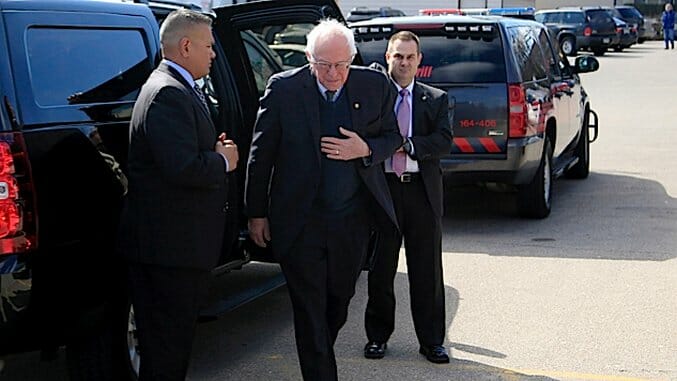Forget Party Unity: The New DNC Email Leak Means There’s No Going Back For Sanders’ Democrats
Photo courtesy of Getty
As Bernie Sanders delivered a livestream address to his supporters on Thursday about the future of his movement, he signaled an eventual end to the campaign. Encouraging his supporters to get involved, Sanders vowed to help Hillary Clinton defeat Trump conditional upon the Democratic Party adopting a “real progressive agenda.” However, earlier in the day news broke about a different story that undercut the Vermont Senator’s calls for eventual party unity.
On the same website that published the DNC’s 200-page Donald Trump oppo file, the hacktivist known as “Guccifer 2.0” released what appears to be an internal email from the DNC discussing strategy, which served to confirm what many of Sanders’ supporters have felt all along: The Democratic Party leadership has had its thumb on the scale for Hillary Clinton in the primary. The email, dated May 26, 2015, about a month after Sanders announced his candidacy, revealed that at least some in the DNC were planning for a Clinton nomination:
DNC was pushing HRC as candidate from May, 2015 of last year. #Guccifer2pic.twitter.com/0rJcTspOvl
— Kick (@MatthewKick) June 16, 2016
In something right out of the Cold War, the DNC has claimed that these releases are part of a “Russian disinformation campaign,” but, according to FAIR, has provided no supporting evidence.
But whatever the reason behind it, this leak has further incensed Sanders’ supporters, and that is telling. It has been a long road to this point, but the fact that the ‘Bernie Or Bust’ Movement has grown to somewhere in the range of 3 to 4 million people (roughly a quarter to a third of Sanders’ supporters) is as much a criticism of Hillary Clinton as a candidate as it is a condemnation of how the party has handled the primary.
From the outset, there has been a perception of favoritism by the DNC leadership. Some of those concerns were due to the very fact that the DNC Chair, Debbie Wasserman Schultz was also Hillary Clinton’s co-campaign chair in 2008.
When Wasserman Schultz scheduled just six sanctioned debates at odd times when viewership would be predictably low, and after crucial deadlines to change one’s voter registration in states like New York, and then threatened to ban candidates from those if they participated in unsanctioned ones, any hopes she’d had of appearing impartial were dashed.
-

-

-

-

-

-

-

-

-

-

-

-

-

-

-

-

-

-

-

-

-

-

-

-

-

-

-

-

-

-

-

-

-

-

-

-

-

-

-

-








































